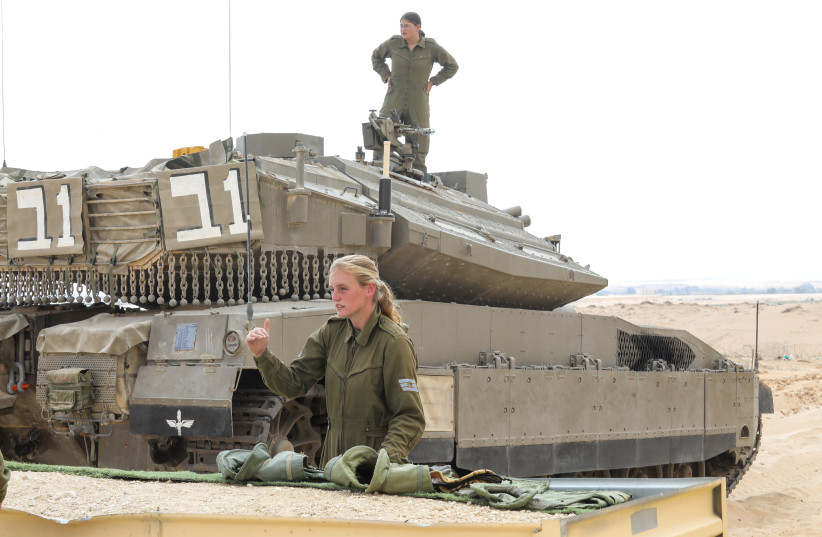There are many stories of tragedy emerging from the events of October 7, but there are tales of triumph and heroism as well, and director/screenwriter Ayelet Menahemi and actress/screenwriter Eleanor Sela are already at work on a movie about the first all-female IDF tank unit, which fought Hamas that day.
Menahemi and Sela have collaborated before, on the movie Seven Blessings, a complex story about two generations of Moroccan women, which is still playing in theaters around Israel. It won the Ophir Award for Best Picture, as well as Best Director, Best Actress (Reymonde Amsallem), and Best Screenplay and is under consideration for the Oscar shortlist for Best International Feature, which will be announced on December 21.
Choosing the story of a tank crew
When asked why they had chosen the story of the tank crew, out of all the stories of the war, to adapt for the movies, Sela replied, “It’s a story that, relative to the pain of the war, has a happy ending. They saved many lives. And it’s a story with a beginning and an end, unlike the story of the hostages, which continues, unfortunately, and not like the fighting in Gaza, which continues. And it’s a story people will want to see at the movies, which is important... And it’s also our connection to a female-centric story, of women who made history twice. First by overcoming the opposition of people who didn’t think that women should be combat soldiers, and it’s the first time that a tank unit of women’s soldiers has fought in a war, in Israel and in the world, and they fought bravely and effectively. It’s a story that needs to be told.”
This tank unit was the subject of an in-depth report on Keshet 12 News by Danny Kushmaro. Producer Ehud Bleiberg, who has made such films as The Band’s Visit and Image of Victory, saw the news report and contacted Menahemi, saying he wanted to make the movie.
“And he asked, what do you think of directing it?” She said she would, and that she wanted Sela to write it, and wanted to work with Ronen Ben Tal, the producer of Seven Blessings, as well. But she admitted she felt a certain hesitation. “Who would dare, who would have the chutzpah to make a movie about events we haven’t processed yet, at a time when we don’t know when things will end?” she said.

“I read a very wise article on what kind of cinema is it possible to make today. The article had a suggestion, that now is a time to return to a very patriotic kind of cinema, celebrating heroism, that was how Israeli cinema started, to return to the dawn of Israeli cinema.”
Sela added, “Seven Blessings became something more than a movie, it’s a cultural event, and after you make a movie like that, what’s next? You want to make something that has a value that is beyond the purely cinematic... And these days, to be a female fighter in a tank unit, it’s actually being discussed in the Supreme Court, it’s an important issue.” She said she felt a sense of mission about telling the story of female fighters: “They proved themselves beyond all doubt that day. We need to give women equal opportunity in the army.”
Currently, Menahemi and Sela are working on researching the story in depth, all of which is being done in coordination with the IDF.
“We’re building the foundation for the movie,” said Sela. “With Seven Blessings, we did research, but it was based on the story of our families. Here, we’re learning new concepts.”
They are doing more than gathering facts, said Menahemi, but trying to understand the motivations and emotions of the women involved. Sela said that her background as an actress would help them in writing this story, that they were trying to get into the heads of the characters, the way she does when she is performing.
“It won’t be a documentary, we want to give ourselves the artistic freedom to highlight the personal drama as well as the battlefield action.” Working with the soldiers is complicated by the fact that they are still fighting the war, and some are actually in Gaza now, she said, but she was confident they would find times to talk.
“This drama will be created out of the greatest respect for the truth,” said Menahemi. “And with great sensitivity.”
